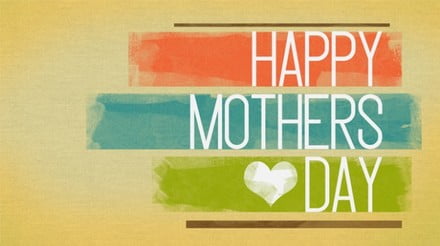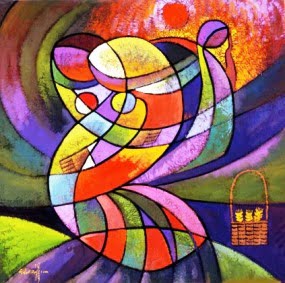A sermon preached from Ruth 1:1-18 at Springfield Christian Church, Springfield, VA
 Mother’s Day . . . it’s a day on our calendar much like Christmas or Easter brimming over with sentimentality and expectation, isn’t it? We have in our heads (or least the Hallmark card industry has in our heads) visions of what this day is suppose to feel like. We have visions in our head of what this day is suppose to be like and smell like. Received affection. Affirmed praise. Pretty cards and flowers. The perfect gifts wrapped with pretty bows. No strife. No misunderstanding. No pain.
Mother’s Day . . . it’s a day on our calendar much like Christmas or Easter brimming over with sentimentality and expectation, isn’t it? We have in our heads (or least the Hallmark card industry has in our heads) visions of what this day is suppose to feel like. We have visions in our head of what this day is suppose to be like and smell like. Received affection. Affirmed praise. Pretty cards and flowers. The perfect gifts wrapped with pretty bows. No strife. No misunderstanding. No pain.
But I don’t know about you but my family and my home isn’t perfect. Perfect is not what I woke up to this morning. And I imagine you didn’t wake up to perfect either.
And so today, maybe in your family you haven’t spoken to your son or daughter for months and you wonder if they’re really going to call home today?
Maybe in your family the pain of a loss of mom still feels fresh or even still full of ache after all these years?
Maybe in your family is not complete in the way you dreamed about it as a child—no partner to have children with or no children in your home at all?
And in all of this, there are rubs and bruises. There are broken dreams and lost hopes. You might have even wondered why you bothered coming to church this morning since the words “Mother’s Day” are on the front cover of the bulletin. For all this imperfection is too much to bear.
But, might there be another way to engage with this the second Sunday of May? This the 7th Sunday of Eastertide? And most of all a good day to be in worship because we believe as the Psalmist says, “This is the day that the Lord has made?”
I believe there’s another way. There’s a gospel way to think about mothers and families today. And our Old Testament text from Ruth chapter 1 offers us some answers.
As we open to the book of Ruth, what we find is a tale of broken hopes, yes. But also a journey of redemption, a journey of redemption for a family in the way the God creates family.
What we first learn as we begin with verse one of chapter one is this: “In the days when the judges ruled, there was famine in the land and a certain man in Bethlehem in Judah went to live in the country of Moab, he and his wife and two sons.”
Thus our story begins with a crisis: famine.
Bethlehem had no more bread. Though the literal translation of the word Bethlehem means, “House of Bread” at this time, we learn people are starving. The family of Elimelech and his wife Naomi realized that they must move his family to a foreign land if they are going to have any chance of survival. So they go. Food is found. They try to make a new life for themselves in Moab. This family of four embraces their refuge status.
And over the course of several years Elimelech’s sons, Mahlon and Chilion marry women from their new home, Orpah and Ruth. What joys!
All was going well until tragedy struck this family again.
First Elimlech died. What a loss!
 Then after they’d been in Moab for 10 years, the scripture tells us that Mahlon died. Then, Chilion passed too.
Then after they’d been in Moab for 10 years, the scripture tells us that Mahlon died. Then, Chilion passed too.
Three deaths one after another after another. Sit with this a moment. How in the world did poor Naomi get out of bed in the morning? Her husband, her first son and then her second. I believe not only was this loss seemingly emotionally insurmountable but culturally impossible to navigate as well.
Because this was the context: the laws of the day stated that a woman without nearby male relatives or offspring was completely on her own. No way to work. No way to own property. No way to re-marry without a dowry from a male relative to help her. How would Naomi and her daughter-in-law not starve?
So given all of this, persistent Naomi comes up with a plan, the best plan she can muster. She’s heard that there’s food again in Judah. Though Moab has grown to be her home and the last place she has memories with her beloved, she sees light at the end of the tunnel. And this light looks like being a beggar back in her hometown. She believes she must go back. She’ll find food there.
So, quickly Naomi’s mind is made up. She’ll travel, solo though.
In preparation for the journey, Naomi takes her two daughters-in-law aside, to have that woman-to-woman talk, to set things straight, and to pour out her sorrow. “I’ve gotta go” Naomi says but “You’ve got to stay. I can offer you nothing more.”
Can you imagine both the overwhelming grief and courage it took for Naomi to say these words?
Because grief does what it does--- often pushes people away, says let me be alone, let me deal with this and get through this so that my pain doesn’t bring pain to you too.
But isn’t it true, even in grief, we sometimes have the capacity to think of the other? Naomi felt concern for her daughters-in-law. Naomi knows that Orpah and Ruth could start over. They could find other husbands. They could have children with them. They could move on with their lives and forget hopefully one day that this painful chapter ever existed. So she urges them to stay. Stay in Moab.
Bottom line: Naomi asks her daughters-in-law to choose security, a norm, what society would call the “best case scenario” given the less than desirable circumstances for them.
Orpah and Naomi cry and cry and object to this parting.
Yet, Naomi clearly speaks her mind in verse 11, “Turn back my daughters, why will you go with me?’
Orpah eventually agrees and set back toward her home place.
But Ruth is different. She refuses to believe that family is defined by the cultural and economic system. She refuses to accept that this very hard patch is the end of the story or all of the story. She refuses to let Naomi’s pain be the determinate of their future.
So in verse 14, we read that Ruth “clings to” Naomi.
I think it’s interesting that Ruth chooses the Hebrew word for cling which is the same verb used in Genesis chapter 2 when after the creation of the first man and first woman the instructions are, “a man must leave his father and mother and cling to his wife.”
Ruth is not going to leave Naomi! She says with her body language, “I love you and I won’t let you go.” Powerful.
And Ruth’s speech to Naomi that follows is one that you might very familiar with. You might have heard it read at weddings (or even your own like it was at mine!). But if I was going to give a theology lesson here I don’t believe her speech is a text about marriage but rather a powerful word about how it is that God creates families.
These are more than beauty words. They are words full of devotion!
Commentator John Holbert advises us: “We must remember the exact context of this speech if we are to recover its wonder. Ruth has been dismissed by Naomi; she plainly is not in any of Naomi’s future plans but she still says: Do not force me to abandon you, or to turn away from following you.”
Most of all, Ruth will not take no for an answer! And she models this:
 Of course, the journey to Judah and the early days there would not be an easy road for Ruth. Redemption stories never are.
Of course, the journey to Judah and the early days there would not be an easy road for Ruth. Redemption stories never are.Listen to the cost. For Ruth to follow God’s path for family, she’d give up her homeland, her Moabite passport and all things familiar. She too would become a refugee in a foreign place. She’d face a vulnerable journey ahead where nothing would be certain. What would life be like in Judah? No one really knew.
But, she’d be with Naomi. She’d be claimed in a new family. She’d be in exactly the place in life she needed to be--- though not perfect or ideal, she found her place to belong even still.
I love how this text ends in verse 18. “When Naomi saw that [Ruth] was determined to go with her, she said no more.”
I.e. Chatty Naomi with her plan for everything, with her pain and her future all nicely worked out in a package with a bow on top gets rendered speechless.
This kind of family “I chose you” devotion is something she did not expect.
But who really does?
When the Spirit begins to move, when life’s most powerful redemption stories find us, when someone not obligated to love us does, we’re speechless too.
The way God creates families might make us speechless too.
And this my friends is the good news I have to offer you today on a day of so much family expectation and potential disappointment:
Don’t hear me wrong. Biology is great. Or can be great. The mothers and fathers and sisters and brothers that we are born alongside and grow up with can be some of God’s greatest gifts to our days.
But, if there is anything that the story of Ruth and Naomi teach us that we need not idolize our blood line. Our God is about connecting us to one another so many deeper ways. Our God is in the business of creating Spirit families. And Jesus had a lot to say about it too:
Not only did Jesus tell his disciples: “Who are my mothers and brothers and sisters? Those who do my will.”
And connect his own mother to a new son (to John) upon his death—with no biological ties I might add.
But Jesus gave us the Holy Spirit and the Holy Spirit birthed the church—a place where we are all welcomed and joined together as one.
And so if this is true: may we act like it. May we love one other. Abide with one another. Bear with one other.
And say to one another when hard times come, just as Ruth said to Naomi that day: “Do not press me to leave you or to turn back from following you! Where you go, I will go; where you lodge, I will lodge; your people shall be my people, and your God my God. Where you die, I will die—there I will be buried.”
God’s family is deeper and longer and higher and wider than any one home, than any one mother or father or sister or brother. We belong to something great-- the family of God.
AMEN